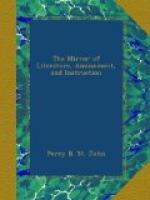* * * * *
THE SKETCH-BOOK
MY FIRST INTERVIEW WITH SIR WALTER SCOTT.
By the Ettrick Shepherd.
One fine day in the summer of 1801, as I was busily engaged working in the field at Ettrick House, Wat Shiel came over to me and said, that “I boud gang away down to the Ramseycleuch as fast as my feet could carry me, for there war some gentlemen there wha wantit to speak to me.”
“Wha can be at the Ramseycleuch that wants me, Wat?”
“I couldna say, for it wasna me that they spak to i’ the byganging. But I’m thinking it’s the Shirra an’ some o’ his gang.”
I was rejoiced to hear this, for I had seen the first volumes of “The Minstrelsy of the Border,” and had copied a number of old things from my mother’s recital, and sent them to the editor preparatory for a third volume. I accordingly went towards home to put on my Sunday clothes, but before reaching it I met with THE SHIRRA and Mr. William Laidlaw coming to visit me. They alighted and remained in our cottage for a space better than an hour, and my mother chanted the ballad of Old Maitlan’ to them, with which Mr. Scott was highly delighted. I had sent him a copy, (not a very perfect one, as I found afterwards, from the singing of another Laidlaw,) but I thought Mr. Scott had some dread of a part being forged, that had been the cause of his journey into the wilds of Ettrick. When he heard my mother sing it he was quite satisfied, and I remember he asked her if she thought it had ever been printed, and her answer was, “Oo, na, na, sir, it was never printed i’ the world, for my brothers an’ me learned it frae auld Andrew Moor, an’ he learned it, an’ mony mae, frae are auld Baby Mettlin, that was housekeeper to the first laird o’ Tushilaw.”
“Then that must be a very auld story, indeed, Margaret,” said he.
“Ay, it is that! It is an auld story! But mair nor that, except George Warton and James Steward, there was never ane o’ my sangs prentit till ye prentit them yoursell, an’ ye hae spoilt them a’thegither. They war made for singing, an’ no for reading; and they’re neither right spelled nor right setten down.”
“Heh—heh—heh! Take ye that, Mr. Scott,” said Laidlaw.
Mr. Scott answered by a hearty laugh, and the recital of a verse, but I have forgot what it was, and my mother gave him a rap on the knee with her open hand, and said, “It was true enough, for a’ that.”
We were all to dine at Ramseycleuch with the Messrs. Brydon, but Mr. Scott and Mr. Laidlaw went away to look at something before dinner, and I was to follow. On going into the stable-yard at Ramseycleuch I met with Mr. Scott’s liveryman, a far greater original than his master, whom I asked if the Shirra was come?
“O, ay, lad, the Shirra’s come,” said he. “Are ye the chiel that mak the auld ballads and sing them?”




